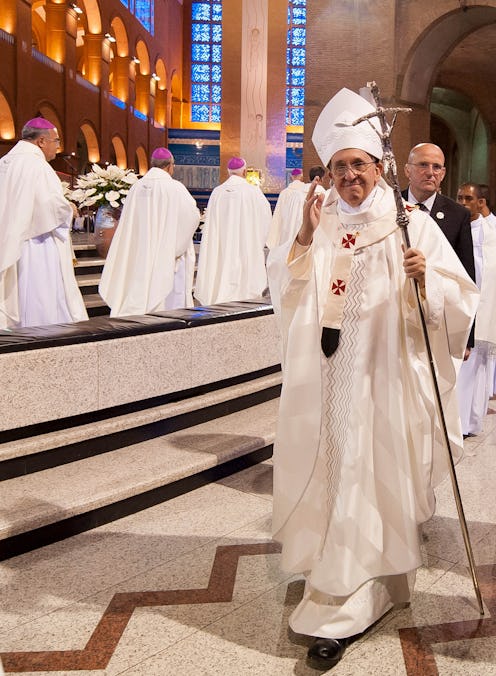News
Pope Francis Said WHAT?!
If the PopeMobile had sirens, this would be the time to use them: Pope Francis just gave the first big interview of his six-month Vatican reign and quite bluntly said that the Church has gotten a little “obsessed” with social issues — and hinted at changes in the (um, mostly non-existent) functional role of women in the Church.
“We cannot insist only on issues related to abortion, gay marriage and the use of contraceptive methods,” Francis said Thursday. He called for discussion of those issues to be done contextually, but maybe just a little less often, please. “It is not necessary to talk about these issues all the time.”
The interview is comprised of a series of smaller chats with Rev. Antonio Spadara, editor-in-chief of La Civiltá Cattolica, an Italian magazine that’s closely tied to the Church.
But let’s just hold on real quick, because turns out, Pope Francis has some interesting views about women. “I am wary of a solution that can be reduced to a kind of ‘female machismo,’" he said, "because a woman has a different makeup than a man."
Pope Francis seems to take a rather nineteenth-century view on gender: he seems to present women as the complement to men in the church, rather than as across-the-board equals. “The feminine genius is needed wherever we make important decisions,” he said.
Sooo, what does that mean for women in the Church? “The challenge today is this: to think about the specific place of women also in those places where the authority of the church is exercised for various areas of the church,” Francis said. He added:
The church cannot be herself without the woman and her role. The woman is essential for the church. Mary, a woman, is more important than the bishops. I say this because we must not confuse the function with the dignity. We must therefore investigate further the role of women in the church. We have to work harder to develop a profound theology of the woman... But what I hear about the role of women is often inspired by an ideology of machismo.
The concept of machismo is a huge part of Latin America, where Francis grew up, and also Italy, the culture in which he is surrounded. "Maschismo" is a sense of hyper-masculinity, of being more man than man, and of using perceived gender superiority to justify social superiority. It’s like the Kardashians of the gender world: Important because they think they’re important.
Machismo became unfashionable with the rise of feminism, but it’s still ingrained in the culture, even in a closeted way. In this case, the “female machismo” Francis speaks of isn’t the liberated woman per se. It seems instead to imply a woman who turns the overinflated notion of masculinity back on her own gender: It “identifies defiance and force with success,” writes Diane Marting in The Sexual Woman in Latin American Literature.
Just as men used machismo as a gendered vehicle to social superiority over women, Francis seems concerned about women who might appropriate machismo for themselves and use it as a crude way to assert dominance in an institution in which men have always worn the pants (well, robes).
But at least he's taking the Church on a more progressive direction towards gay rights. "During the return flight from Rio de Janeiro I said that if a homosexual person is of good will and is in search of God, I am no one to judge. By saying this, I said what the catechism says," Francis said. "Religion has the right to express its opinion in the service of the people, but God in creation has set us free: it is not possible to interfere spiritually in the life of a person."
Until now, Francis has just been a little afraid to speak up about his opinions because, you know, it’s pretty bold to critique the thousands-of-years-old institution he’s in charge of — not to mention one that’s deeply personal to people across the world in terms of their spirituality and faith.
At least his overall message was one of progress. “We have to find a new balance; otherwise even the moral edifice of the church is likely to fall like a house of cards, losing the freshness and fragrance of the Gospel,” he said.
Oh, and recently he posed for his first "selfie..."
So, you know, the Church is getting there. It might not be 21st-century there, but it’s getting there. (The interview is published in full here.)
